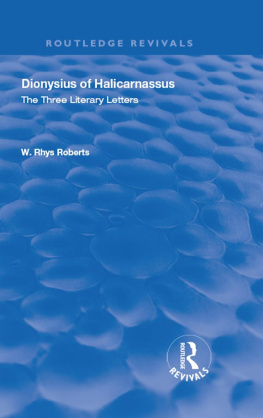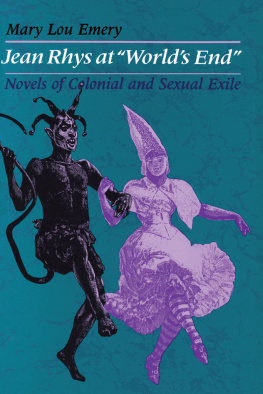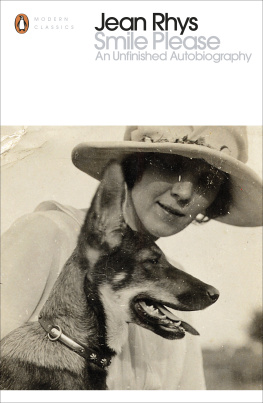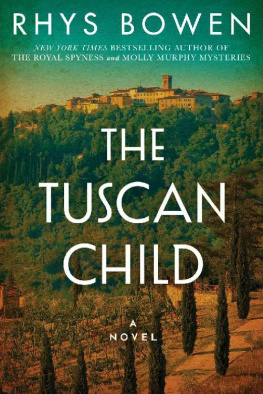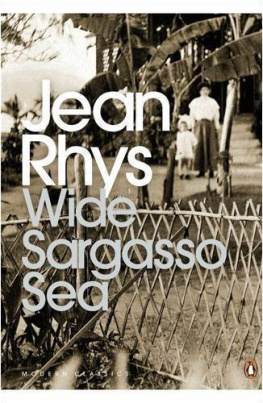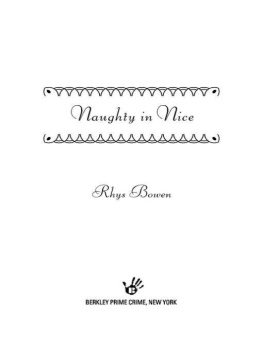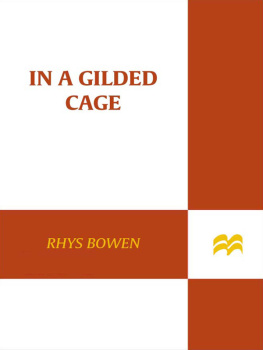Routledge Revivals
Dionysius of Halicarnassus
Dionysius of Halicarnassus
The Three Literary Letters
W. Rhys Roberts
First published in 1901 by Cambridge University Press
This edition first published in 2019 by Routledge
2 Park Square, Milton Park, Abingdon, Oxon, OX14 4RN
and by Routledge
52 Vanderbilt Avenue, New York, NY 10017, USA
Routledge is an imprint of the Taylor & Francis Group, an informa business
1901 by Taylor & Francis
All rights reserved. No part of this book may be reprinted or reproduced or utilised in any form or by any electronic, mechanical, or other means, now known or hereafter invented, including photocopying and recording, or in any information storage or retrieval system, without permission in writing from the publishers.
Publishers Note
The publisher has gone to great lengths to ensure the quality of this reprint but points out that some imperfections in the original copies may be apparent.
Disclaimer
The publisher has made every effort to trace copyright holders and welcomes correspondence from those they have been unable to contact.
A Library of Congress record exists under ISBN:
ISBN 13: 978-0-367-19475-8 (hbk)
ISBN 13: 978-0-429-20268-1 (ebk)
DIONYSIUS OF HALICARNASSUS
THE THREE LITERARY LETTERS
P. 1741 fol. 103r ( = p. 19p. 17 huius editionis). Vide p. 49 infra.
DIONYSIUS OF HALICARNASSUS
THE THREE LITERARY LETTERS
(EP. AD AMMAEUM I, EP. AD POMPEIUM, EP. AD AMMAEUM II)
THE GREEK TEXT EDITED
WITH
ENGLISH TRANSLATION, FACSIMILE, NOTES, GLOSSARY OF RHETORICAL AND GRAMMATICAL TERMS, BIBLIOGRAPHY, AND INTRODUCTORY ESSAY ON DIONYSIUS AS A LITERARY CRITIC
BY
W. RHYS ROBERTS, LITT.D.,
PROFESSOR OF GREEK IN THE UNIVERSITY COLLEGE OF NORTH WALES BANGOR; LATE FELLOW OF KINGS COLLEGE, CAMBRIDGE; EDITOR OF LONGINUS ON THE SUBLIME.
CAMBRIDGE UNIVERSITY PRESS
Cambridge, New York, Melbourne, Madrid, Cape Town, Singapore,
So Paulo, Delhi, Dubai, Tokyo
Cambridge University Press
The Edinburgh Building, Cambridge CB2 8RU, UK
Published in the United States of America by Cambridge University Press, New York
www.eambridge.org
Information on this title: www.cambridge.org/9780521720137
Cambridge University Press 1901
This publication is in copyright. Subject to statutory exception and to the provisions of relevant collective licensing agreements, no reproduction of any part may take place without the written permission of Cambridge University Press.
First published 1901
This digitally printed version 2010
A catalogue record for this publication is available from the British Library
ISBN 978-0-521-72013-7 Paperback
Cambridge University Press has no responsibility for the persistence or accuracy of URLs for external or third-party internet websites referred to in this publication, and does not guarantee that any content on such websites is, or will remain, accurate or appropriate.
GULIELMO GEORGIO RUSHBROOKE
PRAECEPTORVM HABILISSIMO
PARATISSIMO AMICORVM
PREFACE
THIS book is designed on the same general plan as the edition of Longinus on the Sublime which was published by the Cambridge University Press in 1899. The Syndics have undertaken to issue presently, in a similar form the Greek treatise (not hitherto edited in England) known as Demetrius de Elocutione; and I hope that the three companion volumes may be followed in due time by two works of larger scopea new critical and annotated edition of the Rhetoric of Aristotle, and a History of Greek Literary Criticism.
A common purpose underlies the series of books thus projected. Many as are the aspects under which the ancient classics have been studied, no sufficiently resolute and comprehensive effort seems yet to have been made to view Greek literature through the eyes of Greek critics. These critics have much that is common to them all: they have also much that is individual in each. In common they possess the power, which a modern can never hope fully to attain, of appreciating the most delicate shades of Greek literary expression. Their individuality is sufficiently seen in such a contrast as that presented by Dionysius and Longinus, two authors admirably adapted to supplement and balance one another. Neither is entirely one-sided; but Dionysius concerns himself mainly with questions of literary form and technique, whereas Longinus dwells more on that moral nobleness which he thinks he discerns in all really great literature. The former has chiefly in view the art of literature, the latter its spirit. The latter is impressed by what is elemental and unapproachable in genius; the former reminds us that great artists are also great craftsmen.
The three epistolary essays included in this volume are chiefly occupied with points of interest affecting four great Greek prose-writers: Aristotle, Demosthenes, Plato, Thucydides. All the three letters are more or less polemical, being protests (i) against a literary fiction of some indiscreet Peripatetic, who had maintained that the oratory of Demosthenes was formed upon the Rhetoric of Aristotle ; (2) against an excessive admiration, and servile imitation, of the style of Plato; (3) against the adoption of a similar attitude towards the style of Thucydides. The letters are interesting, and variously suggestive, in themselves. But it is hoped that the present volume will also serve as a kind of general introduction to the entire body of extant critical work which we owe to Dionysius. In the Introductory Essay and in the Bibliography no pains have been spared to give full information, and abundant references, with the view of shedding light on all the literary essays of Dionysius; and in the Notes and Glossary a like effort has been made to illustrate his literary opinions and technical language by means of quotations from himself and other Greek critics. The task has been one of some difficulty, since no general introduction of the sort here offered exists either at home or abroad and no English translation of any of the literary essays of Dionysius has so far appeared. The difficulty of finding suitable English equivalents for the technical terms of Greek literary criticism is, indeed, far greater than any who have not essayed the task of translation could well imagine. I have, however, derived much incidental help, in this and other ways, from Sir Richard Jebbs Attic Orators and Dr J. E. Sandys Orator of Cicero, both of which books bear witness to an intimate knowledge of the critical writings of Dionysius. In textual matters I am much indebted to the work of Herwerden, Weil, Usener and Radermacher; but in constituting my own text I have striven throughout to exercise an independent judgment, and have specially collated (for the purposes of this edition) the important Paris MS. 1741. In the revision of the proof-sheets I have had most valuable help from my friends Mr G. B. Mathews, Mr W. H. D. Rouse, and Mr W. J. Woodhouse. Nor must I omit to mention the care and acuteness which the Readers of the University Press have once more shown in the discharge of their exacting duties




